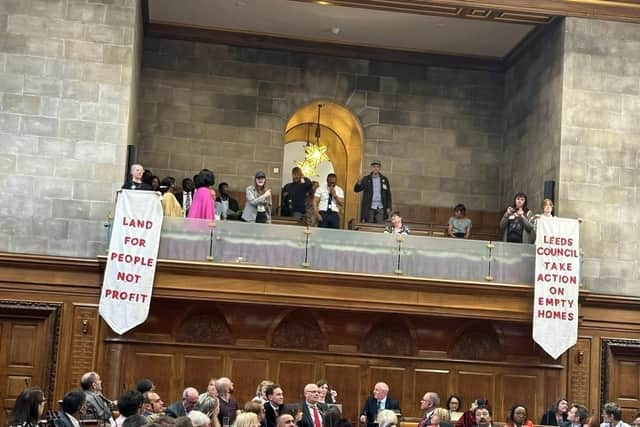Acorn Leeds housing campaigners behind civic hall protest warn about “state of chaos” as they call for action
and live on Freeview channel 276
Members from Acorn Leeds disrupted the city council’s annual mayor-making on May 23 to complain about empty homes and housing conditions. Now, in an interview explaining their motives further, the group has criticised the Labour administration for voting against the introduction of a second homes tax in March. At the time, senior Labour councillors said such a move was not yet legal, although the party did commit to considering the idea if and when it becomes lawful.
Acorn describes itself as a community-based union and it tackles social issues on behalf of its members, such as housing, evictions and debt. The group has also hit out at councillors for, they claim, not responding to their requests for a meeting about the city’s housing issues. Dave Aldwinkle, an Acorn Leeds organiser, said: “Housing is in a state of chaos across the board, both in social and affordable housing and in the private sector too. The housing crisis is being felt by everyone. We know that Leeds City Council, with the best will in the world, can’t solve that overnight, but a second homes tax would be a partial solution to a bigger problem.”
Advertisement
Hide AdAdvertisement
Hide AdThe tax, which would effectively amount to a premium on council tax bills for property owners with multiple homes, was debated by councillors at a meeting in March. The idea was tabled in a white paper by the Liberal Democrats, who suggested the move could raise around £3m in revenue. Other authorities, including North Yorkshire, have committed to introducing such a tax as soon as they are able to do so.


Mr Aldwinkle said: “We want that money to be invested in affordable and social housing problems. It’s been estimated it would bring in £3m, but we believe it could be as much as £4m or £5m. It could be used to insulate a block of flats, or build new playground for people living in high-rise buildings, or create new housing stock. These are things that would make a massive difference people’s lives. There are so many problems.”
Councils are expected to be given the go-ahead to introduce such a tax next year if the Levelling Up bill gets parliamentary approval. But Acorn said the administration could use the time beforehand to consult with the likes of its own tenants, about how the cash could be used. Mr Aldwinkle added: “We know they can’t bring it in until the Levelling Up bill comes in but they could commit to it now. They could commit to it and give themselves an opportunity to engage with people living in high-rise blocks and ask them what they want, what they need and what would make their lives better.”
In response, the council’s new executive member for housing, Coun Jess Lennox, said: “At full council in March the administration did commit to consider charging additional council tax on second homes if and when this becomes law and we are fully supportive of that proposal. We have a strong track record of ensuring we take steps to recover all council tax due as allowed by legislation, which is crucial in funding our frontline services. For example, we have used legal powers to enforce extra charges on long term empty homes which has generated just over £4.4m in additional income in the last three years. However, that income is only a small fraction of the £2.5bn cut from council services in Leeds by central government since 2010.”
Advertisement
Hide AdAdvertisement
Hide AdAffordable housing continues to be a major issue, with Leeds house prices being nearly seven times the average annual salary in the city. A report by West Yorkshire Combined Authority (WYCA) said Leeds remained the most expensive place to live in the region.
The average house in the city was worth £220,000 in 2022, according to the latest figures available, while the median annual salary stands at £32,381. Wages rose by five per cent compared to the previous year, while house prices remained static, meaning it should in theory be more affordable for people to buy a house in Leeds now than it was in 2021. However, the squeeze on household budgets and rising interest rates mean that is not necessarily matched by reality. People now have less money to spend on the costs of moving, such as removal vans and putting their own homes up for sale, while the interest rate hike means monthly mortgage payments are higher.
Speaking at a regional housing meeting on Thursday, WYCA officer Thomas Newton said the affordability figures did not take account of other factors, such as interest rates. Mr Newton said: “What we’ve seen between 2021 and 2022 is that the change is due to both median wages rising and house prices stagnating, and that’s led to a lower ratio of house prices to earnings. The trend is on par with what we’ve seen nationally, but the overall level means West Yorkshire is a significantly more affordable place to live than the rest of the country (as a whole).”
Across the whole of the UK, the average house is now priced at more than eight times the average salary. In West Yorkshire, the biggest change across the region’s five authority areas came in Kirklees, where the affordability ratio fell from 6.5 to 5.6 in the space of a year. That was because wages there in rose by 12 per cent over the course of the year, while house prices fell by three per cent.
